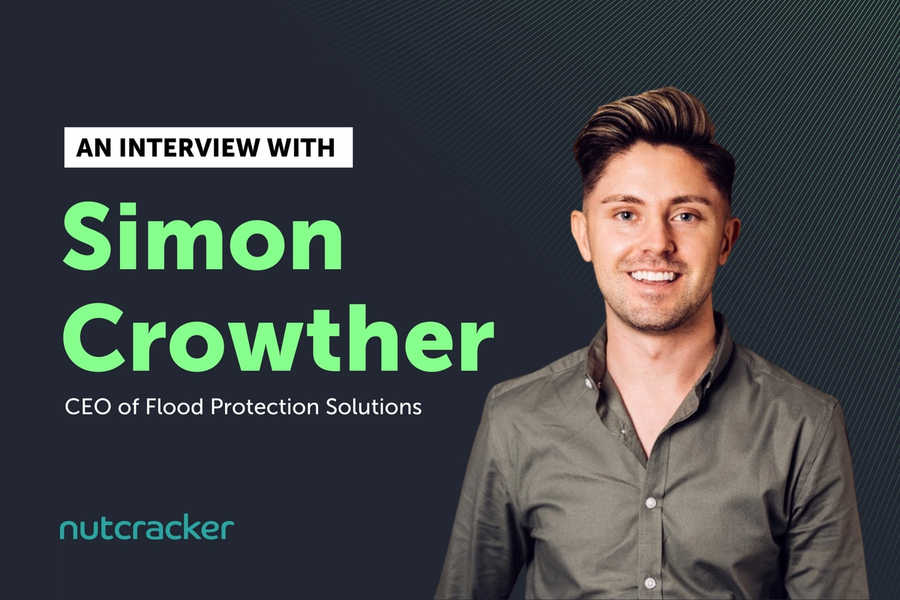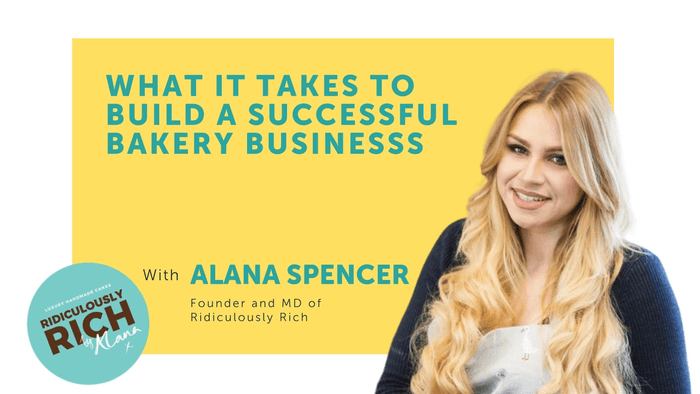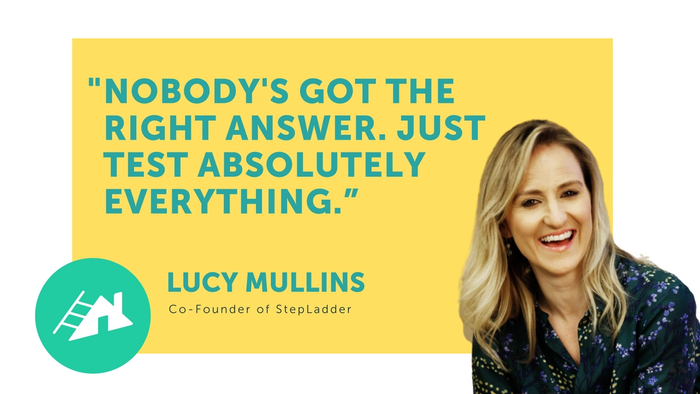News, Views & Opinions
A Q&A with Simon Crowther, CEO of Flood Protection Solutions
After his family home had been flooded five times, Simon founded Flood Protection Solutions in 2012, at just 18 years old. Despite having no business experience, and starting a Civil Engineering degree at the same time as his company, Simon grew the business to become the industry leader in flood defence, and has recently addressed parliament on the topic of flood insurance.
Simon has been recognised by the Forbes 30 under 30 List, Young Entrepreneur of the Year, and Real Leaders’ 100 Visionary Leaders, as well as being named an Attitude 101 Trailblazer.
Nutcracker founder and CEO Jenny spoke to Simon about entrepreneurship, representation, and building a business from your passion.
Obviously, flood protection is a unique business. What was the light bulb moment that inspired you?
Our family home flooded five times. We had to move out for nine months, and we had an insurance claim for £120,000. When we were looking for things to defend the house, everything back then was either really slow or really expensive. I came across a Canadian product called a Water-Gate barrier and ended up importing one. It sat in the garage unused for five years, we hoped we’d never need it, a bit like insurance, but the village flooded once again. We rolled out the barrier and completely saved the house.
I was 18 — young and naive — and I thought, ‘Why is this not available in the UK? Why are we still using sandbags? I'm going to contact the manufacturers to bring it over here.’ At the same time, I was starting a degree in Civil Engineering but I didn't really appreciate how much time my degree would take up. I also thought running a business is going to be easy.
I think my naivety was a blessing. With more life experience you'd probably hesitate and not do it.
I flew out, met the manufacturers, and managed to get sole UK distributor rights to the product. They just really liked the story. And for the first few years, just because I was doing my degree, that product was what we focused on. We had a couple of staff, we did really well — we supplied miles and miles of products to everyone from private residents through to the NHS, to Thames Water, to Yorkshire Water. I think every water company in the UK uses it now. And then we looked to make the business more sustainable, because obviously if you've only got one product, it's not suitable everywhere.
The other thing we realised is that flood advice is generally terrible. There's no real regulation in this sector — there are no barriers to entry. You can do a one-day course and the following day brand yourself a flood surveyor.
They say one in four homes is at risk of flooding. This isn’t even a niche area anymore. We all know more than four people, so we all know someone who's at risk of flooding, but they probably don't know, because 67% of people don't know what their flood risk is.
Most 18-year-olds aren’t thinking about starting a business, let alone when they’re about to start a degree in civil engineering. What gave you that drive?
I've always been quite confident, but at the same time, my parents were getting divorced because my mum had found out my dad had like racked up a quarter of a million pounds worth of debt. I was kind of in a situation where said, ‘I have to fend for myself. I have to make this work.’
That said, I honestly think the biggest thing was just naivety. When I started I didn't know anything about the divorce or debt — that came up the following year. So it started with youthful naivety, then transitioned to a real need to make the business work. Initially, it was just the confidence of youth.
You were eighteen years old with no marketing experience. How do you think the business grew so quickly?
All the people in our local area have been flooded, and they’d seen that we had a barrier that was bright orange and thought ‘What is that?’. The minute we had the UK distributor rights, I put a letter through everybody's door in the local area. We had ten orders within the first week. Bearing in mind they were £2,500 each, that was around £25,000 straight away. And there were no overheads other than product costs. I didn't have to spend anything on marketing initially, then a lot of it was word of mouth.
And at times I’d turn up to the pub, and they’d tell me, ‘Your drinks are paid for’, and it was by someone in there who would say to me ‘You saved my house’. So there have been some really nice moments.
The industry has changed a lot since then. It’s become more competitive — more people come into it constantly.
And it's interesting what you said about people who just take a one-day course and become a ‘flood expert’. That must be quite a big threat to the industry if 25% of homes are at risk.
It's really frustrating — it's a constant battle. I think that's why we have to spend so much on PR and marketing. We're not just advertising our own company, we're having to educate the UK on flood risk. Our marketing is more on education than anything. You can't force someone to buy flood protection, but if they're looking for flood protection, you want to be the expert.
We are still up against the fact that tomorrow you could decide you want to be a flood surveyor, get a glitzy website, then all of a sudden, you're getting business and people don't necessarily even know that you gave them bad advice for 10 years, because it might not flood for 10 years. It's so frustrating.
Is it difficult to find talent for your business?
Yes, for surveying roles, because you tend to find that qualified people are just taken up by like the big Civil Engineering firms. There are not many truly qualified people in the flood sector.
If we then can't find that talent, we can’t grow, and it’s not practical for me to be doing the surveys every single day because we're focusing on so many other aspects.
With one product you were pretty innovative, bringing that product to market when before it wasn't even in the UK. Now you’re diversifying your product line.
I think we were the first people to have an eCommerce site for water pumps. Every flood defence scheme should have a water pump to go with it, but back in 2012, if you wanted to buy a water pump, you basically had two options. You either went into a tool store, which people didn't necessarily feel comfortable with, or you had a really thick catalogue that was only available to trade customers and it was full of jargon.
On our site, we did a video for every single product. At the time, we joked that it was like the LoveHoney videos where they talk about their products and how to use them, but genuinely that was how we made it successful, through making something boring understandable to Joe Bloggs down the street. People have now just copied exactly what we've done, to the point of having the same web feed.
You were on the Forbes 30 under 30 List, Young Entrepreneur of the Year 2016, and one of Real Leaders’ top 100 Visionary Leaders. What do all those awards mean to you?
A lot of it is useful for business credibility. Because of the age at which I set up the business, I've had to focus on my personal profile to be taken seriously. I've had occasions where I've turned up to do a site survey and people have said to me, ‘Before we start, can you tell me what your credentials are?’ And if I was fifty years old, they wouldn't have asked that. Another example that springs to mind — we had a brand-new pickup truck, and it was the first day that the 70 plates came out, so September 2020. I went to do a site survey and the guy asked, “Do they let you out in that often?” I didn't have the heart to tell him I was the CEO.
Things like that happen constantly unless you have enough profile that people start to recognise that you know what you’re talking about.
You’re also an Attitude 101 Trailblazer. How did it feel to be recognised for contributing to LGBT visibility in business?
For me, it was just something that people never really spoke about. People need to be themselves at work and outside of work.
Diversity is so key for the future of engineering. It’s nice that I can help promote LGBT visibility, because of who I am, but I want to support all aspects of diversity within engineering. The statistics are quite shocking. I think only 19% of people doing engineering degrees are female.
I was chatting to the Attitude editor and he was, asking if I felt proud to be included in the list, and yes, I'm really proud. At the same time, I feel like they must have really struggled to find 10 people within science and engineering that they could include. So, while it's really good to be part of it, I don't think it's super competitive to be on that list, compared to something like the Great Entrepreneur Awards. I feel proud to be a part of it, but also a bit sad there aren’t more candidates.
What piece of advice would you give someone who's reading this?
If you don't know what you want to do, but you know you want to be in business, follow your passion. Because whatever you're interested in, you'll become really, really good at it.
A piece of advice for those already running a business is don't be afraid of adapting or pivoting. We’re constantly trying things and seeing what works.
Other than your business, what excites you?
I like a challenge — it doesn’t matter what it is. If I get a no, I always like to find another route. I could never have a personal trainer because if they told me to do ten press-ups, I’d say, ‘Don't tell me what to do!’ If they said to me, ‘I bet you can't do 10 Press ups’, I'd make sure I could do it.
If you’re blazing your own trail in business, and want to stay ahead of the imitators, call Nutcracker on 020 3941 0305 or email hello@nutcrackeragency.com, and find out how we can help you tell your story and grow your business.
Share this:





